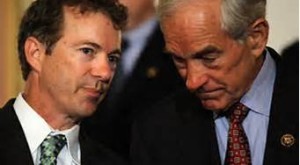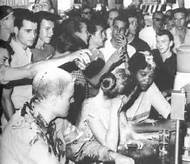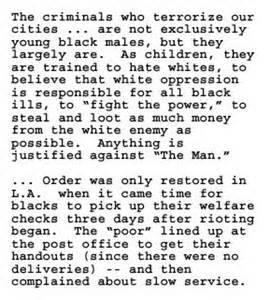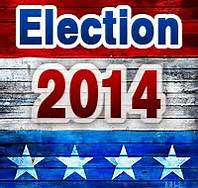In Mr. Paul’s Kitchen, ‘The Big Lie’ Is Passed from Father to Son
Taking a cue from his famous father Ron Paul, US Sen. Rand Paul (R-KY), presumed 2016 presidential hopeful, looked past the hyper-partisan crowd at the recent inaugural Freedom Summit held in New Hampshire, and spoke of compassion and inclusiveness…of reaching out to the unemployed and oppressed. Only a politician with the conservative bonafides of Rand Paul could have gotten away with such heresy at a conservative gathering.
If only it were the truth.
Rand Paul knows all too well that for the Republicans to end their losing streak in presidential elections, they need to pick off some traditional Democratic constituencies such as young people and minorities. To make inroads among young millennials, Paul has ably repackaged his father’s brand of isolationist conservatism into a trendy banner of “libertarianism” (more about this later). This has propelled him to oppose the big bad NSA and its domestic spying program, a scheme that young folks instinctively disdain. Way to go, Mr. Civil Liberties.
In this regard, Rand Paul is following his father’s template for a pathway to a millennial’s heart. Many of us remember Ron Paul’s opposition to the Iraq War and these resulting oddities: Ron Paul tents in Occupy encampments. Ron Paul receiving adulation from overflowing campus crowds. Guess who was taking notes?
At the New Hampshire summit, which was organized by the Koch Brothers’ Americans for Prosperity, Rand Paul advised the party faithful to “hit those who haven’t been listening” by reaching out to ordinary working men and women. “We cannot be the party of fat cats, rich people and Wall Street,” declared Paul. “I want to tell the workers of America that we’re on their side.” Who was that…Elizabeth Warren? Karl Marx? The reality is that Sen. Paul voted against the Dodd-Frank financial reform bill and opposed every other Wall Street house-cleaning initiative in Congress.
Rand Paul’s rhetorical dance in New Hampshire sounded all too familiar to those who heard him speak at Howard University in Washington, DC on April 10, 2013. The topic was the Civil Rights Act of 1964, and the predominantly black student audience heard Sen. Paul insist that he had always fully supported it. “I never came out in opposition to the Civil Rights Act,” the good son contended.
Rand Paul’s Pinocchios
But he did…on at least three separate occasions, according to Washington Post fact-checker Glenn Kessler. To the Louisville Courier-Journal’s editorial board, Paul qualified his support as follows: “I don’t like the idea of telling private business owners…I do believe in private ownership. But I absolutely believe there should be no discrimination in anything that gets public funding…This is the hard part of believing in freedom.” Paul seems to be saying that, if a business does not receive any kind of public funding, it can discriminate. This belief is consistent with Paul’s 2002 letter to the Bowling Green Daily News, in which he wrote: “Decisions concerning private property and associations should in a free society be unhindered. As a consequence, some associations will discriminate.”
Like father, like son. In 2004, on the 40th anniversary of the Civil Rights Act, Congressman Ron Paul (R-TX) rose on the House floor and denounced the historic Act as “a massive violation of the rights or private property and contract, which are the bedrocks of a free society.”
President Lyndon Johnson, by the way, had his work cut out for him in passing the Civil Rights measure. It would not have happened without the president’s “shrewd gamesmanship” with then-Senate Republican leader Everett Dirksen (R-IL). In the end, the Civil Rights Act of 1964 passed by a wide bipartisan tally of 73-27.
It reminded me of another striking bipartisan vote that involved the civil rights of other minority groups striving for societal acceptance. Last June 27, 2013 the US Senate voted 68-32, an unheard-of consensus in these times, to pass a comprehensive immigration bill that would provide a path to citizenship for undocumented Americans. Fourteen Republicans voted affirmatively.
Rand Paul voted nay. Maybe he didn’t get the memo that he himself wrote.
Question: How does somebody with half a brain whip himself into an ideological frenzy over private property rights when there is a clear, consensual imperative to applaud an historical marker to social progress? Why stare kindness in the face and give it a thumbs down? The answer to these questions emerges with an understanding of what is known as “libertarian conservatism,” the kool-aid that father and son Paul drink with great enthusiasm. In the Wikipedia definition, the belief “combines the advocacy of economic principles such as…defense of private property and free markets…under a laissez-faire capitalistic society, with social tenets such as the belief of natural inequality, the importance of religion and the value of traditional morality.” [emphasis mine.]
This is a fancy way of saying: If people are unequal, if private property is held by some but not others, that is what God intended; and government has no say in these matters. The fact that “we, the people” ARE the government doesn’t penetrate. As these concepts embraced by the Pauls are as foreign to me as ancient hieroglyphics, I will leave it at that.
Ron Paul’s Racial Newsletters
In the late 1980s and early 1990s, at a time when Ron Paul was in-between his thrice tenures in Congress, he published newsletters under many titles, such as Freedom Report, Survival Report and Investment Letter. Whatever their purpose was besides making money (The New Republic reported that Ron Paul made close to a million dollars in the publishing venture), there is no doubt that the newsletters contained thoroughly racist material, such as displayed in the above graphic. When the Texas Monthly inquired about them in 1996, Ron Paul took responsibility for them, and slyly indicated that some statements were “taken out of context.”
But when Ron Paul ran for president in 2008, he had a different story ready to go. Paul explained that he didn’t really write the offensive material, didn’t know who did and, in any case, they didn’t represent his views. But, according to an article that cited the Washington Post:
[People] close to Paul’s operations said he was deeply involved in the company that produced the [racist] newsletters…closely monitoring its operations, signing off on articles and speaking to staff members virtually every day. [A person said Paul aimed] to try to increase sales by making the newsletters more provocative. ‘It was playing on a growing racial tension, economic tension, fear of government,’ [the person said].
In my estimation, just as the racist newsletters were not the primary factor in ending Ron Paul’s quixotic bid for the presidency (he never really had a shot), Rand Paul’s tortured back-and-forth reasoning on the Civil Rights Act will not derail his presidential bid, which would be taken far more seriously.
President Rand Paul?
Rand Paul has not shown his hand on a presidential bid. He surely has to be encouraged by the myriad polls out there that show him to be the 2016 Republican front-runner. With NJ Governor Chris Christie weakened by “bridgegate,” Paul “manages the register double-digits everywhere,” according to US News & World Report. Paul tops CNN’s current poll with 16 percent, and is hot on the heels of Bible-thumping perennial candidate Mike Huckabee in two others. It makes a fellow’s eyes wander over to international temperatures when he gets to the weather section of his morning newspaper.
But I’ll end this post on a positive note. Rand Paul’s Kentucky Senate seat is up in…yup, 2016, the presidential year. The Ayn Rand disciple will want to keep that Senate seat even if and when he runs for president. But in order to do so, the Kentucky legislature must pass a law allowing Paul to appear twice on the same ballot…for senator and president. Otherwise he would have to resign his senate seat. This practice has been done many times since Lyndon Baines Johnson first pulled it off in 1960.
The problem for Paul is that Kentucky has a divided state legislature, the state assembly being controlled by Democrats. After the state senate promptly passed the bill, the Kentucky assembly let it die on the vine at the end of the session. They claimed that they were still taking the time to read the entire bill…which was one whole paragraph.
Ah yes, I see the sun peaking through the clouds. That’s “sun,” not “son.”





















































































































